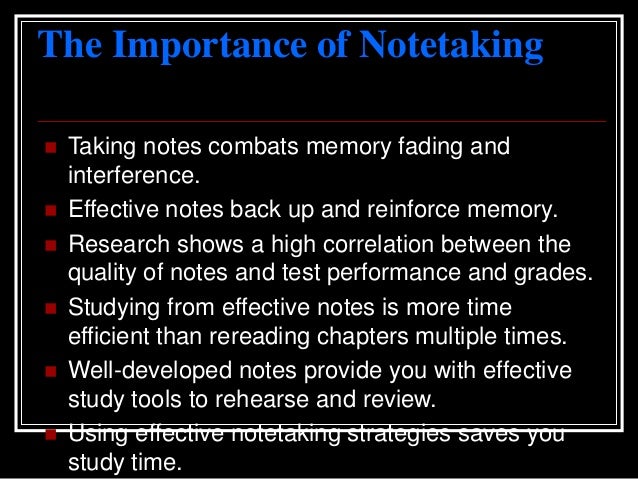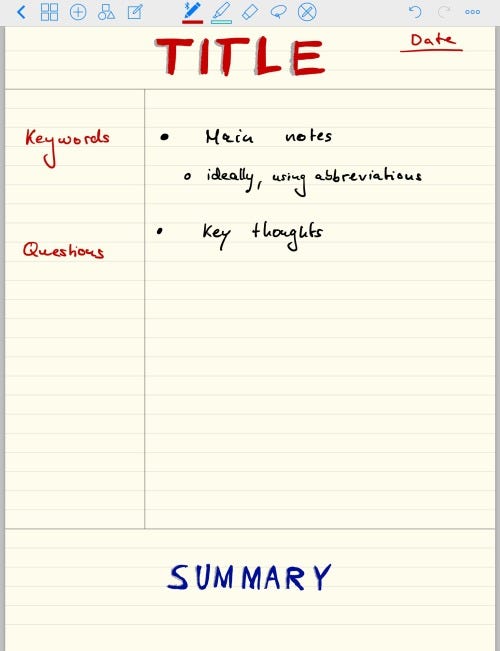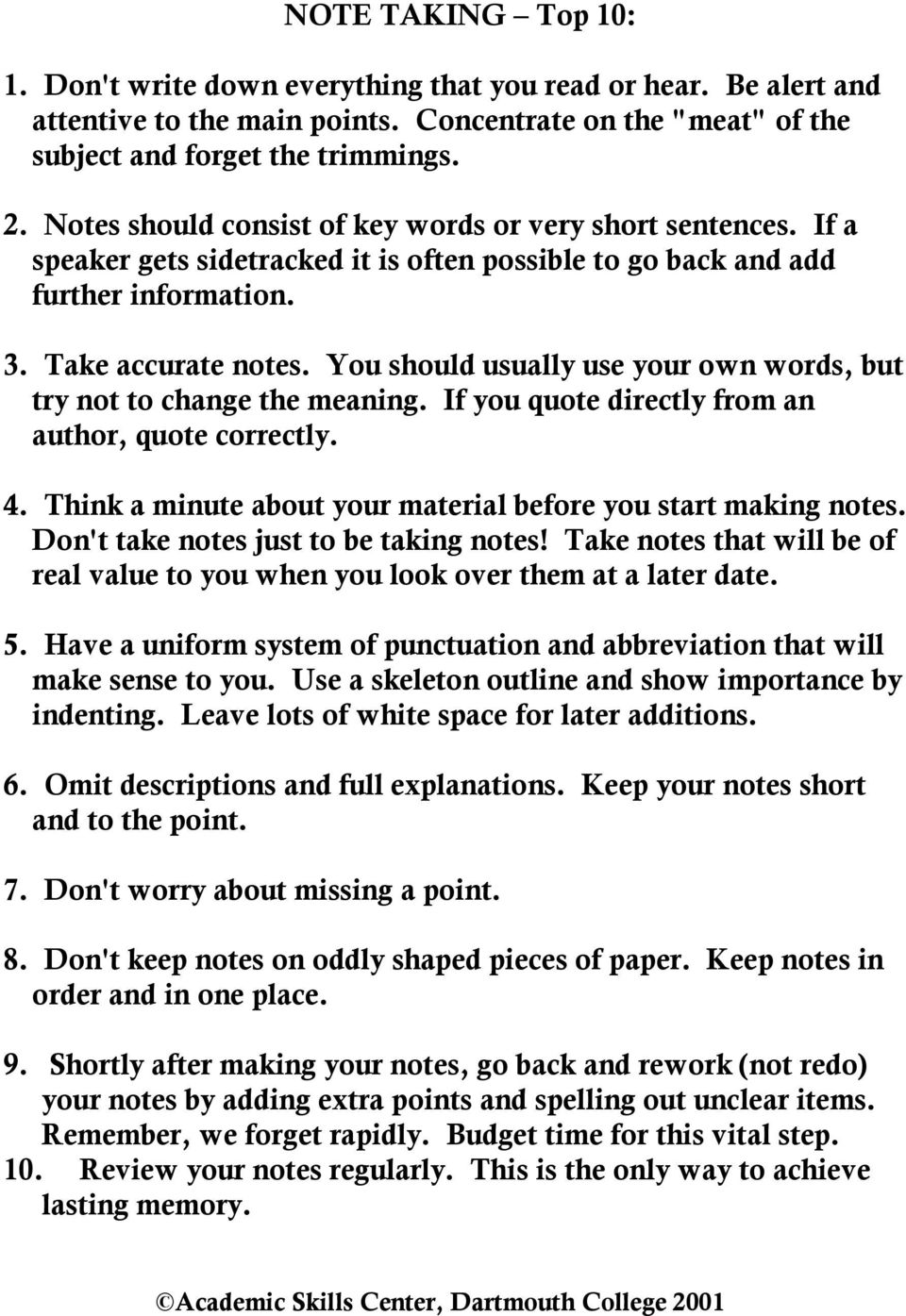- Importance Of Taking Notes While Reading
- The Importance Of Taking Notes 6 Grade
- Importance Of Taking Notes At Work
- The Importance Of Taking Notes
- The Importance Of Taking Notes When You Study
- The Importance Of Taking Notes In Class
Effective note taking may seem like such a basic skill that it’s too elementary to include in a corporate training program or so fundamental that you’d assume all employees would have already learned it at some point. Unfortunately, that is often not the case.
By teaching employees a few simple concepts and practices, you can capitalize on the many crucial benefits of effective note taking.
Note-taking in non-academic settings has a diverse impact. For example, in vocational settings, note-taking can benefit employers by creating an external document that stores the information employers need in order to make hiring decisions and thus improves recall accuracy. However, in vocational settings, note-taking does not improve. “With PowerPoint summaries, students have the product—good notes—but skip the process—the actual taking and reconstructing of notes.” (p. 95) There is also accumulating evidence (the article below references seven studies) that giving students teacher-prepared notes or PowerPoint slides does not improve their performance. Note-taking is one of the most important activities for students. There are a variety of reasons for it but we only want to highlight the most important one here: Taking notes will help you recall information that would otherwise be lost. But taking notes the right way isn’t as easy as it sounds. It isn’t simply about jotting down. Note-Taking is important because: it is essential for providing you with the necessary evidence to inform and develop your argument it assists you in concentrating on and understanding the information you are reading by helping you to summarise the ideas and arguments in the text. The old fashioned note taking method of pen and paper boosts memory and the ability to understand concepts and facts. Perhaps pen and paper will become more prevalent in college classrooms again, as laptops may be given the boot when it comes to enhancing cognitive processes. Sources: Wray Herbert. Ink on Paper: Some Notes On Note Taking.
Benefits of Effective Note Taking
First, let’s consider the benefits of effectively taking notes. The most obvious is information retention. Employers often get frustrated and are surprised when their staff forget or incorrectly recall key action items, deadlines, or other information.
It’s as though it went in one ear and out the other or somehow became mangled somewhere in between. Effectively taking notes helps eliminate this challenge.
Additionally, good notes document the impressions of information at a given point in time. Opinions, feelings, and information change over time, so it can be easy to look back at a meeting from 2 weeks ago and perceive things very differently. Documenting initial perceptions during the meeting is critical for maintaining the integrity of meeting activities, decisions, and outcomes.
Note-Taking Basics
There are some important basics of note taking all employees should understand. Even those not required to take formal notes can benefit from following these practices for their own personal note taking.
- Document key decisions—Documenting important decisions is critical for good note taking. This might include a course of action directed by a manager or a pricing decision for a sales opportunity. It’s simply a waste of time to have to revisit information to reach the same conclusions.
- Outline next steps—Whether it’s making a call to a customer, compiling a report, or giving internal training, documenting the next items to complete as part of a project keeps things moving forward and avoids indecision when staff are unsure what to do next.
- Identify and assign action items—Whether the notes are for personal use or for distribution to the rest of the team, documenting action items is one of the most essential elements of note taking. Action items should include a clear description of the task, as well as to whom it’s assigned and when it’s due.
Taking notes is about more than just jotting down what people say or the highlights of a report. Note taking positively impacts productivity and results by ensuring important decisions are documented and action items are assigned and tracked and that everyone has the same perception of what occurred in a meeting.
Note taking is an underrated skill.
Note taking isn’t just important for college students, it’s a valuable life skill.
If you are able to take good notes, you will be more effective in pursuing your goals whether you are a student, writer, or entrepreneur.
There’s a correlation between taking notes and creative thinking. Creativity isn’t a mythical power, it’s about having lots of ideas and melding the best ones together.
Where do you record and flesh-out these ideas? Notes.
Both Richard Branson and Bill Gates, notable (pun!) creative thinkers, are avid note takers. Branson offers a clear instruction, “It doesn’t matter how you record your notes — as long as you do.”
Effective note taking helps you to remember information and aids your understanding of that information. Once created, your notes then act as a record of your thinking and they also provide the source material for your next creative or business project.


Note taking is a specialist form of writing. This article will help you develop some strategies to improve your command of a vital skill.
Notes boost your understanding
You will only truly understand concepts when you have taken the time to process them. When you take notes you are turning a passive activity – reading or listening – into an active process.
Scanning your eyes across a page or listening to someone speak is easy. Too easy.
You need to *do* something with the information you receive. Note taking is doing.
When you make your own notes, you are sorting, selecting, and combining new information with your existing knowledge. Finding where new ideas fit in with what you already know is how to synthesize unfamiliar concepts into your working knowledge.
Studies have shown that comprehension and recall are improved when people make their own notes rather than rely on materials provided by others. This is called ‘the generation effect.’
By making notes, you force yourself to construct a conceptual mental representation of the ideas you are grappling with. It is this process that helps you comprehend the subject matter you are working with.
It’s the process of writing notes, and not the notes themselves, that helps you gain command of new concepts.
How do you make notes in practice when you are holding a book or listening to a presentation? Summarise, ask questions, note where you strongly agree or disagree. Take the author’s/speaker’s ideas with a pinch of salt; don’t passively agree with everything you encounter. Be critical.
By working with new ideas, you will understand them – and their deficiencies – better.
Importance Of Taking Notes While Reading
(Looking for new ideas to learn about? Read this article on information gathering.)
Notes aid your memory

The ‘spacing effect’ is the idea that you need to revisit ideas in order to make them stick in your mind.
You don’t necessarily need to re-read an entire book or re-watch a whole lecture to remember ideas over the long-term. Instead, you can revisit your notes to refresh the ideas that you’ve encountered.

When you read over notes a day after making them, then a week later, and then a month later, you are far more likely to remember the concepts that you initially encountered.
If this sounds like a lot of work, you’re right. So filter out the fluff and only make the effort to remember things that matter to you. But make sure that you do.
The Leitner System works for this. Take three boxes: The first box contains note cards that you consult once a day; you consult the second box once a week; and you consult the third box once a month. When you are familiar with a card, you move it to the next box. When unfamiliar, you bring the flashcard to a more frequently consulted box.
The Leitner System prioritises notes that you have difficulty recalling, and depriotises notes that you know well. Fortunately, with software, algorithms eliminate the need for a multiple box, card-based system.
Digital options include:
Whatever option you adopt, build a habit of revisiting notes to keep important concepts in your working memory.
Here’s another post on digital note taking, which is about how to make the most of technology in your note taking work flow.
Adopt your own recall system and be deliberate in what you learn: don’t just flirt with great ideas, incorporate them into your intellectual toolkit.
The Importance Of Taking Notes 6 Grade
Notes are a repository of your thinking
Even if you don’t make the effort to commit everything to your long term memory, your notes are still useful as your personal reference library, an external memory aid.
When you need to recall something that you came across a while ago, you can go over the main ideas by looking over your notes. This is why good, comprehensive notes are so useful; they are a catalogue of the best ideas you’ve encountered, and what you thought about them.
Your repository of ideas is especially useful when you keep digital notes. Digitised notes can be grouped and tagged in a variety of ways, as well as searched via text queries.
I use Devonthink for this purpose. My Devonthink library is an archive of all the notes I keep as well as other documents and materials I come across that interest me.
I use Devonthink to store my notes and document my thinking. The software then does some linguistic analysis (a fancy way of saying it counts and compares similar words) and suggests related notes and other materials.
This system means that as long as I keep good notes and store them in Devonthink, I can add any new project topics I’m working on and see related information that I’ve encountered before. Often, I’ve read something in a different context and it never occured to me that it would be relevant to my current project.
Importance Of Taking Notes At Work
Discovering these unexpected linkages is, for me, the joy of Devonthink. It means I can turn to my notes whenever I need inspiration or additional ideas to apply to my projects.
Notes are a resource for your writing
When you have taken good, comprehensive notes and included your own reaction to ideas as well as succinct summaries of key ideas, these notes are invaluable to your future self.
Your notes become stand-alone artifacts that can prompt ideas and solutions to your current projects and tasks.
By reading over a series of notes grouped by a particular topic or theme, you can start to see how a creative project might take shape. In effect, you can use your notes to visualise your thinking on a topic. How has your prior reading (or watching, or listening) addressed this topic, and what do *you* think?
If you’ve taken good notes, you can see:

- Where you agree and disagree with the state of the field
- What ideas you agreed with, and why
- What ideas you disagreed with, and why
- How different ideas could be strengthened/weakened, and why
The Importance Of Taking Notes
If you ask the above questions as you read and watch materials and note down your answers, you will have a rich collection of thought provoking material. This is the first draft not just of writing, but any complex problem you encounter.
With your own reactions to a number of sources documented in this way, your notes can be the basis of your next project. You just need to pose a question and then organise your existing notes in a certain way to create the outline of a response.
Note taking for the win
This is just a short post that I hope will encourage you to dive deeper into the skill of note taking. It’s a really useful skill to have, and is one that pays off immensely in the long term.
The Importance Of Taking Notes When You Study
The more high-quality notes you have, the more creative you can be because you’ll have many ideas and concepts that you understand and are able to work with.
Remember:
The Importance Of Taking Notes In Class
- ‘The generation effect’ – creating your own notes is how you process new information and understand it better
- Revist notes to incorporate important concepts into your working memory
- Use your notes as a library of your thinking. I recommend Devonthink
- Good notes can be used to inform any new project you take on
